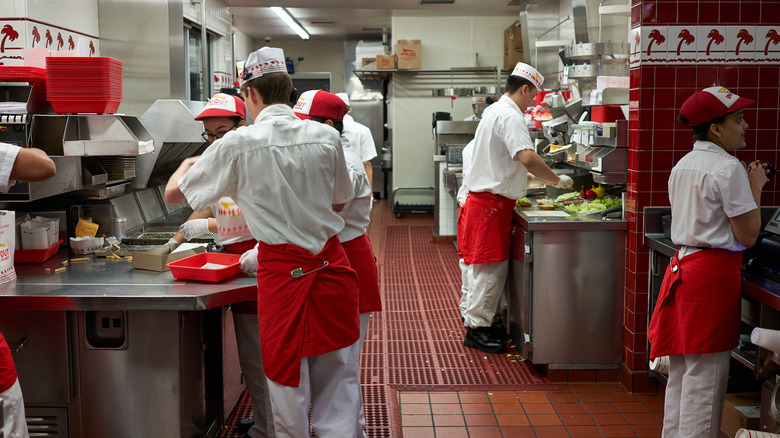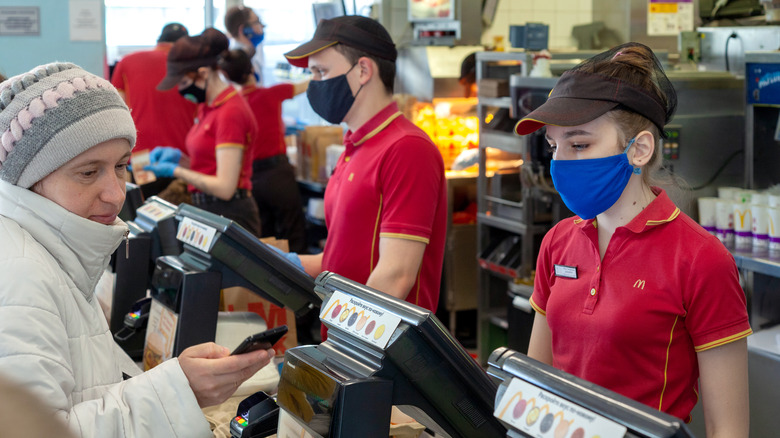California's Fast Food Law Is Now In Referendum Limbo After Court Ruling
California legislation seeking to enhance the lives of fast food workers hit a roadblock in the second week of 2023, at least in its goal of immediate enactment. Aptly named the FAST Act, the legislation initially passed as Assembly Bill 257 on September 5, 2022, explains The Sacramento Bee. That poignantly fell on the first Monday of September, which, as the U.S. Department of Labor notes, is a day reserved for celebrating the achievements of American workers in both economic and social realms. Now a lawsuit has blocked temporary implementation of the law, potentially until Election Day 2024.
Players in the ongoing saga include high-impact business advocates such as Save Local Restaurants, which raised almost $14 million in less than a year from the likes of Chipotle, McDonald's, and Starbucks. The lawsuit, filed by Save Local Restaurants, represents a powerful coalition of heavy hitters such as the U.S. Chamber of Commerce, National Restaurant Association, and International Franchise Association (IFA), per the Nation's Restaurant News.
On the other hand, fast food workers have strong support and advocacy from the Service Employees International Union (SEIU), an organized labor union comprising roughly 2 million members from the service industry, ranging from the restaurant and hospitality sector to healthcare, property services, and the public sector. With the FAST Act's potential to greatly impact America's restaurant industry, its new legal restrictions by a Sacramento Superior Court judge could be significant – at least until a well-supported referendum progresses.
The legal ruling and what's at stake
The FAST Act of 2022, which the state's Department of Industrial Relations (DIR) attempted to implement on January 1, establishes a separate council to oversee and regulate workplace standards and employee pay in the fast-food industry. According to The Sacramento Bee, council regulations had the potential to so provide a minimum wage as high as $22 for California fast-food workers whose employers have at least 100 U.S. store locations. Considering the U.S. Department of Labor's May 2020 statistics claiming 384,890 fast food and counter workers in California, the law could affect a vast number of people.
Save Local Restaurants is attempting to bring the legislation to California voters, based on the successful acquisition of the necessary 1 million signatures to place AB 257 (the FAST Act) on the 2024 election ballot. However, the signatures were still being validated while the law marched toward January 1 implementation, leading to a lawsuit filed by the Save Local Restaurants Coalition. A ruling in the plaintiff's favor by California Superior Court judge Shelleyanne W.L. Chang on January 13 effectively halted the progression of the law.
Proponent and opponent reactions
The ruling may seem like a defeat for the state's fast-food workers, but for now, it's only a delay. The judge gave county officials until January 25 to verify the 1 million referendum signatures, and if successful, as expected, voters will get their say. The law may linger in legal shadows until November 2024.
In a statement reported by Nation's Restaurant News, the business coalition lauded the court's decision, pointing out that over a million Californians asserted, with their signatures, the right to consider the law before they "bear its burden." Proponents of worker protections under the FAST Act are standing firm on the merits of the legislation, per The Sacramento Bee, stating through SEIU President Mary Kay Henderson that lawsuits and referendums will never stop workers from organizing and revealing the "violence, discrimination, harassment, wage theft, and retaliation they face on the job while being paid some of the lowest wages in the state."


